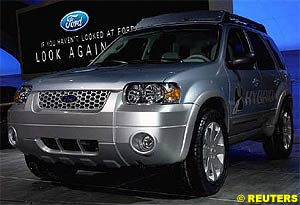

Automotive News and Reviews for the Petrolhead
Reuters Motoring Commentator
In this week's issue:
- DaimlerChrysler Recalls 680,000 Mercedes
- Ford Puts Positive Spin on High Gas Prices
DaimlerChrysler 's Mercedes unit is recalling around 680,000 passenger cars worldwide due to suspected problems with the braking systems in some cars, the automotive group says.
Daimler said last week it is offering free inspections to customers of its E-class saloon (sedan) built after March 2002, SL-class sports cars built after October 2001 and T-models built after March 2003.
A spokesman said that prior inspections showed that of all the models of these classes and years, roughly two out of every thousand proved to have problems with the Sensotronic Brake Control system. If the same percentage applied, this would translate in this case to about 1,360 units affected out of the 680,000 vehicles.
The carmaker said the defect in the system's braking hydraulics meant drivers need to brake earlier and with greater force to bring the car to a stop.
According to the company, high-mileage vehicles where the brakes have been used more than average - such as taxis - have mainly been hit by the problem. The spokesman declined to comment on what the cost of the recall would be for DaimlerChrysler.
Mercedes, which delivered nearly 1.1 million cars to customers in 2003, is the company's most prestigious and profitable car unit. Including its Smart and Maybach brand sales, the Mercedes Car Group contributed roughly 55 percent to the group's operating earnings last year.
Analysts view recalls as more of a danger to the brand's image than the group's profits.
In a recent quality survey by J.D. Power and Associates, Mercedes-Benz cars were found to have 106 problems per 100 vehicles, placing it far below Toyota's luxury brand Lexus, but still ahead of the BMW brand and Volkswagen's premium brand Audi.
"Mercedes' quality image has been slipping in many surveys," Merrill Lynch wrote in a note to clients on April 29.
Ford has put a positive spin on higher U.S. gasoline prices, even though they could hurt sales of some of the gas-thirsty vehicles that generate much of its automotive profits in North America.
Ford Chairman and Chief Executive Bill Ford Jr., who has advocated higher U.S. gas taxes in the past, told the company's annual shareholder meeting that surging pump prices could change the tastes of U.S. car buyers and help drive the country toward a more fuel-efficient future.
Ford had been asked what he was doing to improve what he readily acknowledged to be the poor average fuel economy of his company's current U.S. vehicle fleet.
Until recently, he said, because of "very cheap gasoline" in the United States, what customers were saying was: "We want bigger engines and we want bigger vehicles."
In Ford's case, as with other Detroit automakers, satisfying that demand has meant a disproportionate dependence on sales of big sport utility vehicles and full-size pickups.
Now, however, as Ford told one environmental activist who questioned him at the meeting, gas prices could "help drive customer behaviour the way you'd like to see it."
"In the rest of the world you don't have this disconnect as much," said Ford, speaking of the clash between consumer preferences and a society's overall environmental goals.
"In Europe where gasoline prices are very high you have a CO2 reduction path that is coming down quite nicely," Ford said, referring to carbon dioxide emissions.
"It's because there's a convergence of pocketbook issues with society issues," he added, saying the same thing may soon prove true in the United States. If it does, he added, cleaner-burning vehicles will be not just a social imperative, but also "a business opportunity."
Ford, who has sometimes been criticized as an unfaithful ally of the U.S. environmental movement, said the company founded by his great-grandfather was already spending more than half of its research and development money on environmental issues.
He did not elaborate, but said the company was "pouring enormous resources" into the development of gas-electric hybrid vehicles and other alternate fuel vehicles as it prepares to help lead the way toward a greener U.S. auto industry.
![]() DaimlerChrysler Recalls 680,000 Cars
DaimlerChrysler Recalls 680,000 Cars
![]() Ford Puts Positive Spin on High Gas Prices
Ford Puts Positive Spin on High Gas Prices
 "We're in the business of giving customers what satisfies their demands," he said.
"We're in the business of giving customers what satisfies their demands," he said.
| Contact the Editor |
© 1995-2005 Kaizar.Com, Inc. . This service is provided under the Atlas F1 terms and conditions.
|
Volume 10, Issue 20
Atlas F1 Exclusive
Interview with Tony Purnell
Articles
Every Other Sunday
The Paint Job - Final Part
2004 Monaco GP Preview
2004 Monaco GP Preview
Monaco GP Facts & Stats
The F1 Trivia Quiz
Columns
Rear View Mirror
Bookworm Critique
On the Road
Elsewhere in Racing
The Weekly Grapevine
> Homepage |